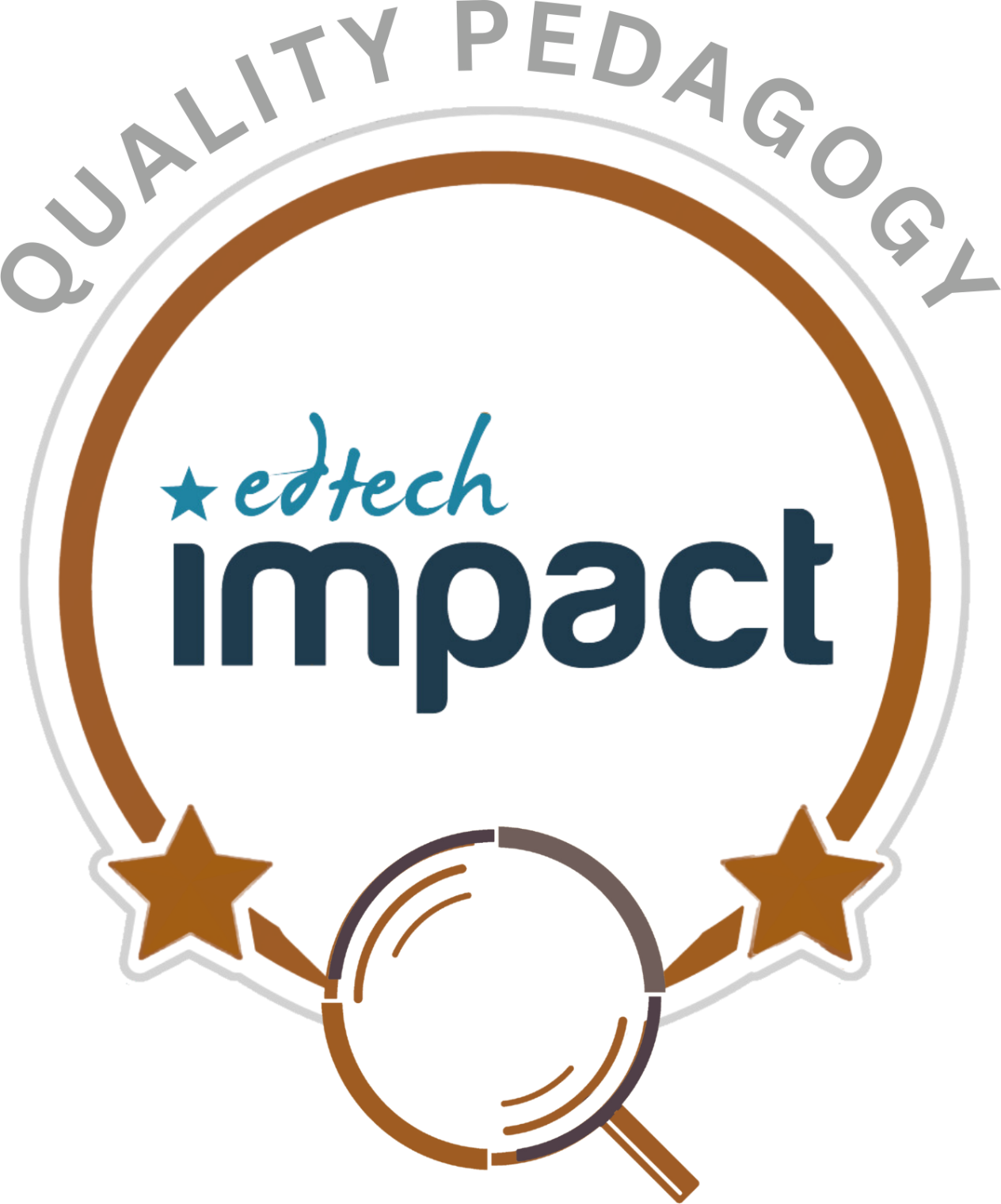What is Kindiedays Pedagogical Management Solution?
Pedagogical Management and Documentation Solution for childcare centers:
•Flexible adaptation to national curriculums
•Tools for the whole learning process based on Finnish best practices
•Pedagogical documentation and portfolios to show children’s learning
•Formative assessment for learning
•Statistics and reports to lead with data
•Platform approach with the integration of lesson plans and external resources
•Tools for teacher's daily routines, messaging, and collaboration with parents
Recommended Usage
Daily..
Compare Kindiedays Pedagogical Management Solution with...
Answer a few questions to help the education community
Have you used Kindiedays Pedagogical Management Solution before?
Pedagogy
Certified by Education Alliance Finland, 11/2021
EAF Evaluation is an academically-backed approach to evaluating the pedagogical design of a product. EAF evaluators assess the product using criteria that covers the most essential pedagogical aspects in the learning experience.
PassiveActive
Kindiedays adapts to the kindergarten's needs (choice of curriculum, chance to add menus, etc.). There are plenty of tools for pedagogical documentation so, depending on the teacher's own activity, children's engagement to activities they do in the kindergarten does not go unnoticed. Rather, it is documented and communicated in several occasions to relevant people in a child's life.
RehearseConstruct
The experience on using Kindiedays is very personalized, depending on the child's needs and agreements with the guardians. It encourages teachers to share and communicate with guardians, which helps in identifying the strengths and development points for the child. The data from pedagogical documentation tells the guardians, what the children have learned, and guides in reflecting their progression.
LinearNon-linear/Creative
The teacher can choose how to proceed and choose among the objectives in the curriculum. It is possible to create evidence that is individual for each child, and that way make learning visible for everyone.
IndividualCollaborative
Kindiedays allows rich social interaction through digital channels as part of the early learning experience. The child's portfolio is created and shared with parents, who can then discuss the events in Kindergarten with the child.
Learning goals
Certified by Education Alliance Finland
The supported learning goals are identified by mapping the product against the selected reference curriculum and soft skills definitions most relevant for the 21st century.
- Practicing to take care of one's own wellbeing and health
- A positive attitude towards food and eating is encouraged.
- Children are encouraged to enjoy the outdoors and exercise during all seasons.
- Children's abilities to take care of their health and personal hygiene are supported.
- Children have the opportunity to use their imagination and creativity in play activities.
- Daily physical activity supports children’s thinking and reflection.
- Children’s skills to structure, name and describe the environment and its phenomena are supported.
- Moments of success are recognized and celebrated with the children and they learn to support and encourage others.
- Practicing getting dressed, eating, and taking care of personal hygiene and the child’s own belongings
- Children are supported to express their emotions and self-regulate.
- Children are encouraged to take initiative in actions.
- The children plan, implement and evaluate activities together with the nursery staff.
- Practicing versatile ways of working
- Practicing to give, get and reflect feedback
- Practicing communication through different channels
- Practicing to work with others
- Practicing to take care of one's own and other people’s safety
- Supporting healthy and varied eating habits.
- Things and objects are named with the children and different concepts are learned.
- Children practice interaction and expression skills in different situations.
- Learning to notice causal connections
- Practicing categorization and classification
- Using technology for interaction and collaboration (also internationally)
- Using technology to express one’s emotions and experiences
- Using technology for interaction and collaboration
- Understanding and practicing safe and responsible uses of technology
- Using technological resources for finding and applying information
- Understanding technological system operations through making
- Using technological resources for finding and applying information
- Children learn to use information and communication technology in a versatile and safe way.
- The children plan, implement and evaluate activities together with the nursery staff.
- Children are instructed to act responsibly and safely.
- Children are instructed to respect and protect their own and others’ bodies.
- Children are encouraged to be persistent and not be discouraged by failures.
- Children have the opportunity to use their imagination and creativity in play activities.
- Daily physical activity supports children’s thinking and reflection.
- Children’s skills to structure, name and describe the environment and its phenomena are supported.
- Moments of success are recognized and celebrated with the children and they learn to support and encourage others.
- Children are encouraged to ask and question.
- Using technology as a part of explorative process
- Practicing to plan and execute studies, make observations and measurements
- Practicing to look things from different perspectives
- Practicing to create questions and make justifiable arguments based on observations
- Enabling the growth of positive self-image
- Practicing to give, get and reflect feedback
- Practicing to express own thoughts and feelings
- Learning to understand the meaning of rules, contracts and trust
- Learning to listen other people’s opinions
- Practicing to work with others
- Encouraging to build new information and visions
- Supporting student to build their own linguistic and cultural identity
- Learning to face respectfully people and follow the good manners
- Learning to know and respect human rights
- Practicing to notice links between subjects learned
- Learning to combine information to find new innovations
- Encouraging to build new information and visions
- Learning to build information on top of previously learned
- Practicing to notice causal connections
- Practicing to take care of own and other people’s safety
- Practicing to take care of one's own and other people’s safety
- Practicing to take care of one's own wellbeing and health
- Encouraging the growth of positive self-image
- Recognizing habits that are good for sustainable living
- Practicing to recognize and express feelings
- Children's relationship with nature and responsible activities in the environment are strengthened.
- Developing the children's mathematical thinking and supporting positive attitude towards mathematics.
- Children's abilities to take care of their health and personal hygiene are supported.
- A positive attitude towards food and eating is encouraged.
- Supporting healthy and varied eating habits.
- Rhymes, songs, naming objects, and reading and telling stories are used to support language development.
- The children practice telling about and explaining things and conversing.
- Children get to know a variety of texts.
- Children are encouraged to communicate with other children and adults in different situations.
- Children are encouraged to read and write in a playful manner.
- Children's curiosity and interest in languages, texts and cultures is reinforced.
- Children are encouraged to use their imagination and express emotions and thoughts evoked by music.
- Children are encouraged to express themselves both verbally and physically.
- Children's interest in music is reinforced.
- Children's relationship with the visual arts, other visual culture and cultural heritage is developed.
- Children can experiment with different tools and materials of visual expression
- Children practice their visual thinking, perception and interpretation of images.
- Learning to recognise and evaluate arguments and their reasonings
- Learning to find solutions in social conflicts
- Developing problem solving skills
- Practicing to use arts as a way to express
- Practicing to use imagination and to be innovative
- Practicing to use imagination and to be innovative
- Encouraging students to be innovative and express new ideas
- Practicing to improvise
- Practicing creative thinking
- Creating requirements for creative thinking
- Learning to find the joy of learning and new challenges
- Practicing to evaluate one's own learning
- Practicing to set one's own learning goals
- Practicing to take responsibility of one's own learning
- Practicing to find ways of working that are best for oneself
- Practicing to observe spoken and written language
- Practicing strategic thinking
- Using technology to express one’s emotions and experiences
- Using technology for interaction and collaboration
- Understanding and practicing safe and responsible uses of technology
- Using technological resources for finding and applying information
- Using technology as a part of explorative and creative process
- Understanding technological system operations through making
- Using technology resources for problem solving
- Building common knowledge of technological solutions and their meaning in everyday life
- Learning to plan and design own written content and textual representations
- Realizing the connection between subjects learned in free time and their impact to skills needed at worklife
- Connecting subjects learned at school to skills needed at working life
- Practicing versatile ways of working
- Learning to plan and organize work processes
- Learning consumer knowledge and smart economics
- Practicing time management
- Encouraging positive attitude towards working life




